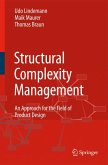The treatise supports understanding the phenomena of complexity in engineering, distinguishes complexity from other challenges and presents an overview of definitions and applied approaches.
The historical background of complexity management is explained by highlighting the important epochs, their key actors and their discoveries, findings and developments. Knowing about the appearance of early system awareness in ancient Greece, the creation of mechanical philosophy in the 17th century and the discovery of classic physics enables the reader to better comprehend modern system sciences and management approaches.
A classification of complexity management approaches by research fields indicates current focus areas and starting points for future discussions. In a comprehensive map, the classification points out mutual overlaps between engineering disciplines in terms of similar complexity management approaches.
Finally, the treatise introduces a generic complexity management framework, which is based on structural management approaches.
The Author
Dr.-Ing. Maik Maurer studied mechanical engineering at the Technical University of Munich (TUM), Germany and received a PhD in 2007 for his research in complexity management. For five years, Maik Maurer taught complexity management and systems engineering at TUM and led research projects in these fields. In 2010, he received the ring of honor from the Association of German Engineers (VDI) and, between 2011 and 2014, he was awarded three prizes for exceptional teaching. Maik Maurer co-chaired the German chapter of INCOSE, is involved in the Design Society and has co-authored the book "Structural Complexity Management". In 2006, he co-founded TESEON, a software and consultancy company for managing complex systems. In 2012, he co-founded Spritz Technology, a company that develops cutting-edge communication technologies.Dieser Download kann aus rechtlichen Gründen nur mit Rechnungsadresse in A, B, BG, CY, CZ, D, DK, EW, E, FIN, F, GR, HR, H, IRL, I, LT, L, LR, M, NL, PL, P, R, S, SLO, SK ausgeliefert werden.
Hinweis: Dieser Artikel kann nur an eine deutsche Lieferadresse ausgeliefert werden.
Es gelten unsere Allgemeinen Geschäftsbedingungen: www.buecher.de/agb
Impressum
www.buecher.de ist ein Internetauftritt der buecher.de internetstores GmbH
Geschäftsführung: Monica Sawhney | Roland Kölbl | Günter Hilger
Sitz der Gesellschaft: Batheyer Straße 115 - 117, 58099 Hagen
Postanschrift: Bürgermeister-Wegele-Str. 12, 86167 Augsburg
Amtsgericht Hagen HRB 13257
Steuernummer: 321/5800/1497
USt-IdNr: DE450055826
Bitte wählen Sie Ihr Anliegen aus.
Rechnungen
Retourenschein anfordern
Bestellstatus
Storno









